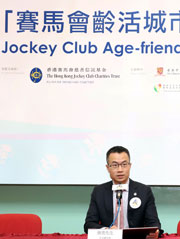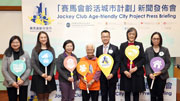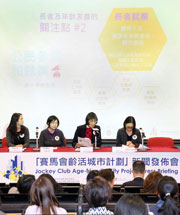

About HKJC
Jockey Club Age-friendly City Project research explores ways to enhance elderly’s quality of life
03/22/2018
In 2015, responding to the challenges and opportunities arising from the city’s ageing population trend, The Hong Kong Jockey Club Charities Trust launched the Jockey Club Age-friendly City Project in eight pilot districts to enhance local elderly people’s quality of life. A total of 39 community-level programmmes have been rolled out so far, directly benefiting over 38,000 people. Theproject has been extended to all 18 districts of Hong Kong in 2017, with cumulative Club funding to date of over HK$190 million. Under the Jockey Club Age-friendly City Project, baseline research in eight key domains defined by the World Health Organization (WHO) is being conducted by four of Hong Kong’s gerontology research institutes to assess the current age-friendliness in society and identify appropriate directions of action.
Today (22 March), at a press briefing to announce the latest results of this research, the Club’s Executive Director, Charities and Community, Leong Cheung was joined by representatives of the four institutes, namely Director of the CUHK Jockey Club Institute of Ageing, Professor Jean Woo; Research Assistant Professor of Sau Po Centre on Ageing at The University of Hong Kong, Dr Cheryl Chui; Assistant Director at the Asia-Pacific Institute of Ageing Studies of Lingnan University, Professor Maggie Lau; and Associate Professor of the Institute of Ageing at The Hong Kong Polytechnic University, Dr Alma Au.
More than 9,500 respondents and 91 focus groups with over 700 members have taken part in the age-friendliness surveys, of whom about 87% were 50 years old or above. The three key domains given the lowest score are community support and health services (3.67 out of a possible 6), housing (3.71) and civic participation and employment (3.87).
Mr Cheung noted that the Club was one of the world's top ten charity donors and was always concerned about the elderly’s quality of life. The elderly was one of four strategic focus areas of the Club and it had been promoting positive ageing through a series of preventative initiatives, he said, and wanted to shift the perception of older people from being recipients to becoming active participants in society once again, so that the community could gain from their extensive knowledge and experience. “The Jockey Club Age-friendly City Project baseline research has identified the public’s views on community age-friendliness, which enables us to implement evidence-based district programmes accordingly,” Mr Cheung explained.
The research team concluded that the low score attributed to the Community Support & Health Services domain was the result of non-user-friendly services such as long waiting hours for medical support and inadequate service information. In terms of housing, some elderly people encountered difficuties when seeking help with flat maintenance, for example the unaffordable costs and a lack of related information, which led to the low score in this domain. With regard to the Civic Participation & Employment domain, the research revealed insufficient job opportunities for the elderly; the more educated the interviewee, the lower score given in this category. In addition, despite the Social Participation domain earning the highest score (4.29) in the research, it was found that those respondents who did not visit elderly centres tended to award a lower score, commenting that there was a lack of social activities and venues or outdoor space for activities.
The research team suggested four directions of action to enhance local age-friendliness, namely the provision of a more age-friendly living environment to raise the elderly’s quality of life; creating more suitable job and volunteering opportunities for the elderly; offering a range of activities based on the varied interests and needs of the elderly; and collaborating with different stakeholders including the Government and business sectors to promote an age-friendly atmosphere.
Phase II of the Jockey Club Age-friendly City Project has been extended from the eight pilot districts, namely Sha Tin, Tai Po, Central & Western, Wan Chai, Kowloon City, Kwun Tong, Islands and Tsuen Wan, to the remaining ten districts of Hong Kong. Based on the results of the baseline research, the project team has developed three-year action plans for each district in collaboration with the District Councils, so as to enhance the age-friendliness of these districts. More than 950 Age-friendly Ambassadors have also been recruited from all districts of the city and age-friendliness messages delivered to citizens through various activities. A year-long programme, Jockey Club Age-friendly City Partnership Scheme, will be launched soon to engage different stakeholders, including business community and public sector, to adopt age-friendly practices in Hong Kong. Please visit www.jcafc.hk/ for more information.
The Hong Kong Jockey Club
Founded in 1884, The Hong Kong Jockey Club is a world-class racing club that acts continuously for the betterment of our society. The Club has a unique integrated business model, comprising racing and racecourse entertainment, a membership club, responsible sports wagering and lottery, and charities and community contribution. Through this model, the Club generates economic and social value for the community and supports the Government in combatting illegal gambling. In 2016/17, the Club’s total direct return to the community was HK$30.5 billion. It is Hong Kong's largest single taxpayer, one of the city’s major employers and one of the world's top ten charity donors. The Club is always "riding high together for a better future" with the people of Hong Kong.

Picture 1:
The Club’s Executive Director, Charities and Community, Leong Cheung, says the Jockey Club Age-friendly City Project baseline research has identified the public’s views on community age-friendliness, enabling evidence-based district programmes to be implemented.

Picture 2:
At today’s press briefing to announce the results of the Jockey Club Age-friendly City Project baseline research, the Club’s Executive Director, Charities and Community, Leong Cheung (3rd right) and Head of Charities (Grant Making – Elderly, Rehabilitation, Medical, Environment & Family), Imelda Chan (1st left) are joined by Director of the CUHK Jockey Club Institute of Ageing, Professor Jean Woo (2nd right); Research Assistant Professor of Sau Po Centre on Ageing at The University of Hong Kong, Dr Cheryl Chui (2nd left); Assistant Director at the Asia-Pacific Institute of Ageing Studies of Lingnan University, Professor Maggie Lau (1st right); Associate Professor of the Institute of Ageing at The Hong Kong Polytechnic University, Dr Alma Au (3rd left) and participant Ms Leung (centre).

